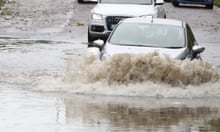A bank holiday heatwave could set record temperatures around the country, with blue skies expected to replace the wind and rain that has dogged August.
South-easterly winds would draw warm air from Europe towards the UK from Friday, bringing rising temperatures and dry, settled weather, the Met Office said. On Monday, the mercury could reach 33C (91.4F), a record high for the August bank holiday weekend.
Steve Willington, the chief meteorologist, said: “We have had a fairly wet and windy August so far. However, that’s going to change this weekend as we see high temperatures, sunshine and light winds return.
Quick GuideWhat is causing Europe's heatwaves?
Show
Is this a record-breaking heatwave?
Temperature records for this time of year have already been broken across much of Europe. The highest ever June temperatures were recorded in the Czech Republic, Slovakia, Austria, Andorra, Luxembourg, Poland and Germany, while France registered an all-time record high of 45.9C.
Why is it so hot?
The latest heatwave, caused by an “omega block” – a high-pressure pattern that blocks and diverts the jet stream, allowing a mass of hot air to flow up from northern Africa and the Iberian peninsula – follows a similar extreme weather event last month that made it the hottest June on record.
Is this heatwave a result of climate breakdown?
It is not possible to pin the heatwave definitively on climate change because weather varies naturally. Moreover, the effects of climate change are not simple. For example, heavy rain and cloud across northern Europe is likely to become more common as the buildup of carbon dioxide in the atmosphere causes the jet stream weather system to become fixed in position.
However, this year’s weather is certainly in line with the predictions scientists have made of rising temperatures, more heatwaves and prolonged droughts interspersed with periods of heavy flooding.
What are the negative impacts of a heatwave?
The body’s ability to regulate its own temperature is crucial; babies and older people are less well able to regulate their temperature and should stay in well-ventilated conditions. In the 2003 European heatwave there were about 70,000 excess deaths attributed to the long hot spell. People with underlying illnesses can also have problems, and even those who are healthy can experience difficulty sleeping and discomfort, so people are advised to stay hydrated and wear loose clothing at night.
There is also an impact on farmers. While warmth at the right time is crucial for crop growth, excessively high temperatures can inhibit that growth, particularly if they are prolonged. Livestock can also suffer in the heat and need extra care.
Fiona Harvey Environment correspondent
“On Saturday and Sunday there’ll be plenty of sunshine across the country, with temperatures reaching into the mid-20s for many. It will be warmest in south-eastern parts, where 30C is possible.
“By bank holiday Monday, temperatures will rise further, with about 33C possible in the south-east.”
The hottest August bank holiday weekend was recorded at Heathrow airport in 2001 when the temperature reached 31.5C. In Wales, 27.3C was recorded in Velindre, Powys, in 2013; in Northern Ireland the record was 27C (80.6F), in Knockaraven, County Fermanagh, in 2003. Monday is not a bank holiday in Scotland.
Last month the highest-ever UK temperature was recorded in Cambridge University Botanic Garden on 25 July when the temperature reached 38.7C. The previous record was 38.5C in Faversham, Kent, in August 2003.
With the hot weather back in time for the weekend, people going on day trips and short breaks have been advised to check their vehicles before setting off.
A spokesman for the RAC, Rod Dennis, said: “Tyre pressure and tread, as well as oil and coolant levels, should all be looked at. Doing so can cut the chances of breaking down.”
HM Coastguard has urged those visiting the coast at the weekend to refrain from jumping into the water from piers, rocks, cliffs or other structures; choose beaches where lifeguards are on duty and take note of their advice; swim parallel to the shore and avoid most harbours and fast-flowing water.









